More than three-quarters of Japanese feel close to Taiwan, and most consider it the Asian region they are most familiar with, a survey commissioned by the Taipei Economic and Cultural Representative Office in Japan showed yesterday.
Tokyo-based Central Research Services conducted the annual survey for the office for a third time to learn how Japanese perceive Taiwan.
Asked to choose a region in Asia that they felt most familiar with — Taiwan, China, South Korea, Thailand, Singapore, Russia, Philippines, Vietnam or India — 46.2 percent of respondents picked Taiwan.

Photo: AP
Of the respondents, 76.6 percent said they felt “close” or “somewhat close” to Taiwan.
Asked why they felt close to Taiwan, most respondents said it was because Taiwanese are friendly and nice.
Other reasons they gave included Japan and Taiwan having a long history of engagement, strong economic connections and shared cultural elements, as well as a large Japanese-speaking population in Taiwan and mutual assistance during earthquakes or the COVID-19 pandemic.
The majority of those who did not feel close to Taiwan attributed it to a lack of knowledge or concern about Taiwan-related affairs.
Sixty-five percent said that Taiwan is “very trustworthy” or “trustworthy,” citing reasons such as Taiwan being friendly to Japan and the two sides’ shared values.
Of the respondents, 72.8, percent said that the relationship between Taiwan and Japan is “good” or “somewhat good,” while only 1.2 percent said it was “bad” or “somewhat bad.”
Of those polled, 59.1 percent said the relationship would continue to develop and 26.6 percent said it would remain the same.
Asked what they thought “the most concerning issue” between Japan and Taiwan was, 44.4 percent said “the impact of the cross-strait situation on Japan.”
To maintain peace and stability in the Taiwan Strait, 57 percent of respondents chose diplomacy and dialogue, while 37 percent said cooperation between Taiwan, Japan and the US.
Of the respondents, 63.5 percent said that they were paying “some” or “close” attention to Taiwan’s presidential election next month.
The survey was conducted online from Oct. 30 to Nov. 1, with 1,000 responses collected from Japanese citizens aged 20 to 89.
It had a 95 percent confidence level and a margin of error of 3.1 percentage points.

Beijing could eventually see a full amphibious invasion of Taiwan as the only "prudent" way to bring about unification, the US Department of Defense said in a newly released annual report to Congress. The Pentagon's "Annual Report to Congress: Military and Security Developments Involving the People's Republic of China 2025," was in many ways similar to last year’s report but reorganized the analysis of the options China has to take over Taiwan. Generally, according to the report, Chinese leaders view the People's Liberation Army's (PLA) capabilities for a Taiwan campaign as improving, but they remain uncertain about its readiness to successfully seize

Taiwan is getting a day off on Christmas for the first time in 25 years. The change comes after opposition parties passed a law earlier this year to add or restore five public holidays, including Constitution Day, which falls on today, Dec. 25. The day marks the 1947 adoption of the constitution of the Republic of China, as the government in Taipei is formally known. Back then the Chinese Nationalist Party (KMT) governed China from Nanjing. When the KMT, now an opposition party in Taiwan, passed the legislation on holidays, it said that they would help “commemorate the history of national development.” That

Taiwan has overtaken South Korea this year in per capita income for the first time in 23 years, IMF data showed. Per capita income is a nation’s GDP divided by the total population, used to compare average wealth levels across countries. Taiwan also beat Japan this year on per capita income, after surpassing it for the first time last year, US magazine Newsweek reported yesterday. Across Asia, Taiwan ranked fourth for per capita income at US$37,827 this year due to sustained economic growth, the report said. In the top three spots were Singapore, Macau and Hong Kong, it said. South

Snow fell on Yushan (Jade Mountain, 玉山) yesterday morning as a continental cold air mass sent temperatures below freezing on Taiwan’s tallest peak, the Central Weather Administration (CWA) said. Snowflakes were seen on Yushan’s north peak from 6:28am to 6:38am, but they did not fully cover the ground and no accumulation was recorded, the CWA said. As of 7:42am, the lowest temperature recorded across Taiwan was minus-5.5°C at Yushan’s Fengkou observatory and minus-4.7°C at the Yushan observatory, CWA data showed. On Hehuanshan (合歡山) in Nantou County, a low of 1.3°C was recorded at 6:39pm, when ice pellets fell at Songsyue Lodge (松雪樓), a